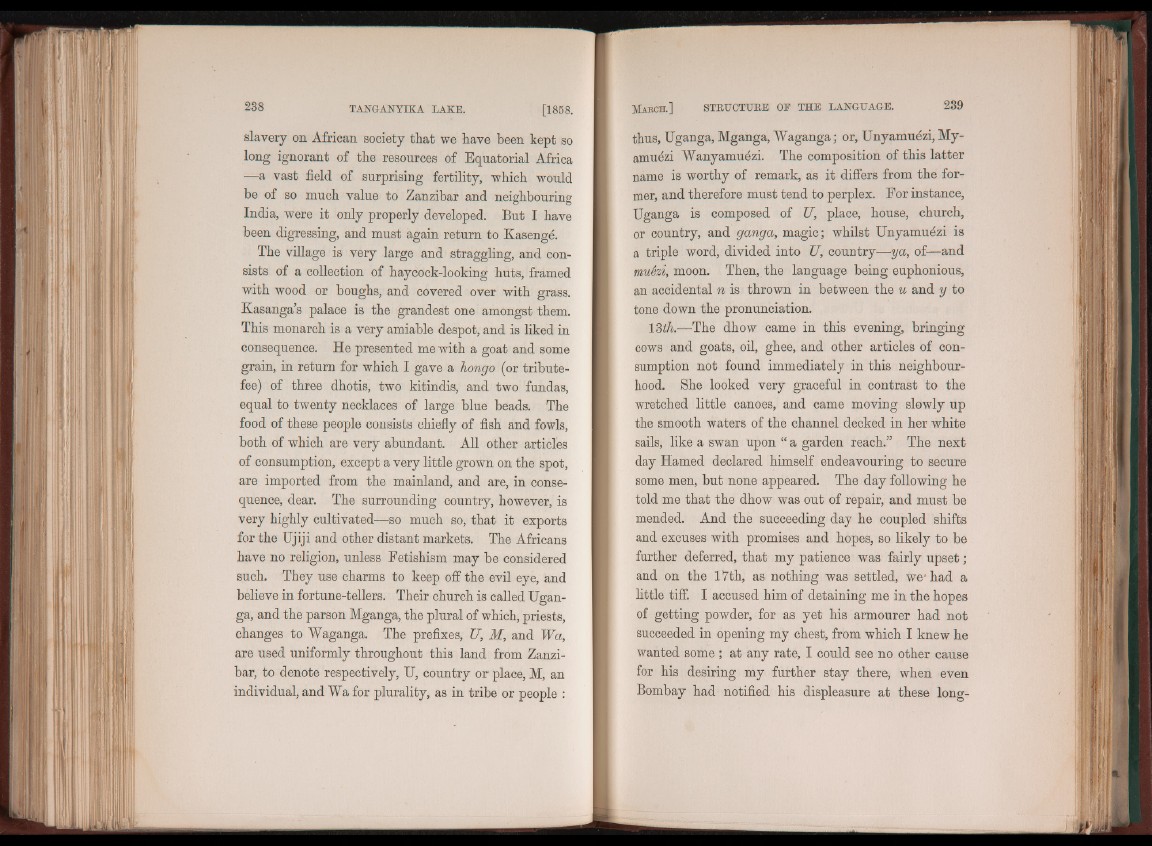
slavery on African society that we have been kept so
long ignorant of the resources of Equatorial Africa
—a vast field of surprising fertility, which would
be of so much value to Zanzibar and neighbouring
India, were it only properly developed. But I have
been digressing, and must again return to Kasengd.
The village is very large and straggling, and consists
of a collection of haycock-looking huts, framed
with wood or boughs, and covered over with grass.
Kasanga’s palace is the grandest one amongst them.
This monarch is a very amiable despot, and is liked in
consequence. He presented me with a goat and some
grain, in return for which I gave a hongo (or tribute-
fee) of three dhotis, two kitindis, and two fundas,
equal to twenty necklaces of large blue beads. The
food of these people consists chiefly of fish and fowls,
both of which are very abundant. All other articles
of consumption, except a very little grown on the spot,
are imported from the mainland, and are, in consequence,
dear. The surrounding country, however, is
very highly cultivated—so much so, that it exports
for the Ujiji and other distant markets. The Africans
have no religion, unless Fetishism may be considered
such. They use charms to keep off the evil eye, and
believe in fortune-tellers. Their church is called Ugan-
ga, and the parson Mganga, the plural of which, priests,
changes to Waganga. The prefixes, U, M, and Wa,
are used uniformly throughout this land from Zanzibar,
to denote respectively, U, country or place, M, an
individual, and Wa for plurality, as in tribe or people :
thus, Uganga, Mganga, Waganga; or, Unyamudzi, My-
amudzi Wanyamudzi. The composition of this latter
name is worthy of remark, as it differs from the former,
and therefore must tend to perplex. For instance,
Uganga is composed of U, place, house, church,
or country, and ganga, magic; whilst Unyamudzi is
a triple word, divided into U, country—ya, of—and
mufai, moon. Then, the language being euphonious,
an accidental n is thrown in between the u and y to
tone down the pronunciation.
13th.—The dhow came in this evening, bringing
cows and goats, oil, ghee, and other articles of consumption
not found immediately in this neighbourhood.
She looked very graceful in contrast to the
wretched little canoes, and came moving slowly up
the smooth waters of the channel decked in her white
sails, like a swan upon “ a garden reach.” The next
day Hamed declared himself endeavouring to secure
some men, but none appeared. The day following he
told me that the dhow was out of repair, and must be
mended. And the succeeding day he coupled shifts
and excuses with promises and hopes, so likely to be
further deferred, that my patience was fairly u p se t;
and on the 17th, as nothing was settled, we'had a
little tiff. I accused him of detaining me in the hopes
of getting powder, for as yet his armourer had not
succeeded in opening my chest, from which I knew he
wanted some ; at any rate, I could see no other cause
for his desiring my further stay there, when even
Bombay had notified his displeasure at these long